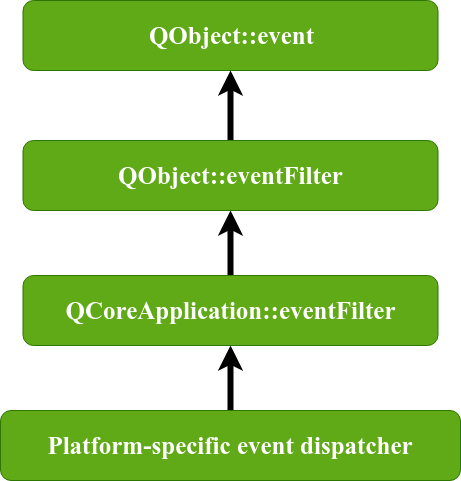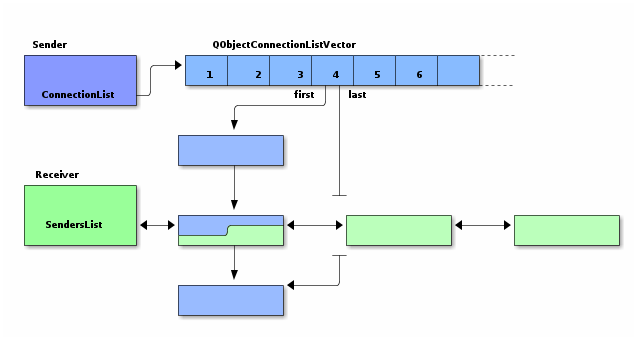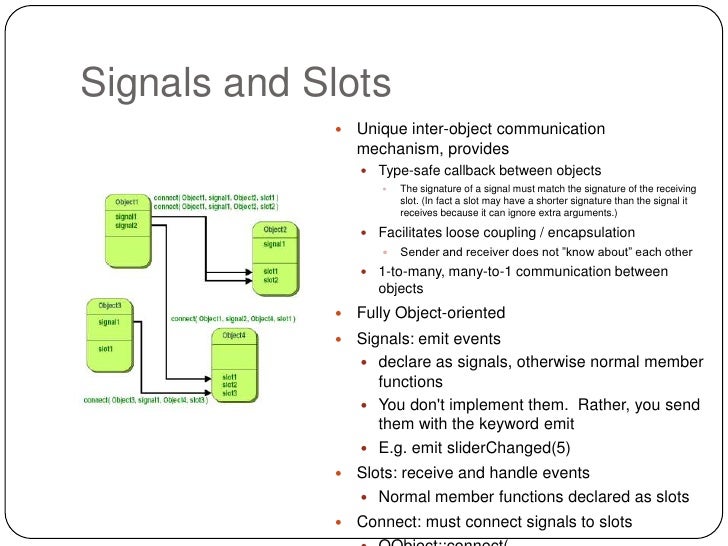Qt Signal Slot Same Class
EnArBgDeElEsFaFiFrHiHuItJaKnKoMsNlPlPtRuSqThTrUkZh
The same signal can be emitted in multiple places. Now, let's define some slots that can be connected to the Circle's signals. Remember last time, when we said we'd see more about the @Slot decorator? We now have signals that carry data, so we'll see how to make slots that can receive it. Signals and slots are loosely coupled: A class which emits a signal neither knows nor cares which slots receive the signal. Qt's signals and slots mechanism ensures that if you connect a signal to a slot, the slot will be called with the signal's parameters at the right time. Signals and slots can take any number of arguments of any type.
This page was used to describe the new signal and slot syntax during its development. The feature is now released with Qt 5.

- Differences between String-Based and Functor-Based Connections (Official documentation)
- Introduction (Woboq blog)
- Implementation Details (Woboq blog)
Note: This is in addition to the old string-based syntax which remains valid.
- 1Connecting in Qt 5
- 2Disconnecting in Qt 5
- 4Error reporting
- 5Open questions
Connecting in Qt 5
There are several ways to connect a signal in Qt 5.
Old syntax
Qt 5 continues to support the old string-based syntax for connecting signals and slots defined in a QObject or any class that inherits from QObject (including QWidget)
New: connecting to QObject member
Here's Qt 5's new way to connect two QObjects and pass non-string objects:
Pros
- Compile time check of the existence of the signals and slot, of the types, or if the Q_OBJECT is missing.
- Argument can be by typedefs or with different namespace specifier, and it works.
- Possibility to automatically cast the types if there is implicit conversion (e.g. from QString to QVariant)
- It is possible to connect to any member function of QObject, not only slots.
Cons
- More complicated syntax? (you need to specify the type of your object)
- Very complicated syntax in cases of overloads? (see below)
- Default arguments in slot is not supported anymore.
New: connecting to simple function
The new syntax can even connect to functions, not just QObjects:
Pros
- Can be used with std::bind:
- Can be used with C++11 lambda expressions:
Cons
- There is no automatic disconnection when the 'receiver' is destroyed because it's a functor with no QObject. However, since 5.2 there is an overload which adds a 'context object'. When that object is destroyed, the connection is broken (the context is also used for the thread affinity: the lambda will be called in the thread of the event loop of the object used as context).
Disconnecting in Qt 5
As you might expect, there are some changes in how connections can be terminated in Qt 5, too.
Old way
You can disconnect in the old way (using SIGNAL, SLOT) but only if
- You connected using the old way, or
- If you want to disconnect all the slots from a given signal using wild card character
Symetric to the function pointer one
Only works if you connected with the symmetric call, with function pointers (Or you can also use 0 for wild card)In particular, does not work with static function, functors or lambda functions.
New way using QMetaObject::Connection
Works in all cases, including lambda functions or functors.
Asynchronous made easier
With C++11 it is possible to keep the code inline
Here's a QDialog without re-entering the eventloop, and keeping the code where it belongs:
Another example using QHttpServer : http://pastebin.com/pfbTMqUm
Error reporting
Tested with GCC.

Fortunately, IDEs like Qt Creator simplifies the function naming
Missing Q_OBJECT in class definition
Type mismatch

Open questions
Default arguments in slot
If you have code like this:
The old method allows you to connect that slot to a signal that does not have arguments.But I cannot know with template code if a function has default arguments or not.So this feature is disabled.

There was an implementation that falls back to the old method if there are more arguments in the slot than in the signal.This however is quite inconsistent, since the old method does not perform type-checking or type conversion. It was removed from the patch that has been merged.
Overload
As you might see in the example above, connecting to QAbstractSocket::error is not really beautiful since error has an overload, and taking the address of an overloaded function requires explicit casting, e.g. a connection that previously was made as follows:
connect(mySpinBox, SIGNAL(valueChanged(int)), mySlider, SLOT(setValue(int));
cannot be simply converted to:
...because QSpinBox has two signals named valueChanged() with different arguments. Instead, the new code needs to be:
Unfortunately, using an explicit cast here allows several types of errors to slip past the compiler. Adding a temporary variable assignment preserves these compile-time checks:
Some macro could help (with C++11 or typeof extensions). A template based solution was introduced in Qt 5.7: qOverload
The best thing is probably to recommend not to overload signals or slots …
… but we have been adding overloads in past minor releases of Qt because taking the address of a function was not a use case we support. But now this would be impossible without breaking the source compatibility.
Disconnect
Should QMetaObject::Connection have a disconnect() function?
The other problem is that there is no automatic disconnection for some object in the closure if we use the syntax that takes a closure.One could add a list of objects in the disconnection, or a new function like QMetaObject::Connection::require
Callbacks
Function such as QHostInfo::lookupHost or QTimer::singleShot or QFileDialog::open take a QObject receiver and char* slot.This does not work for the new method.If one wants to do callback C++ way, one should use std::functionBut we cannot use STL types in our ABI, so a QFunction should be done to copy std::function.In any case, this is irrelevant for QObject connections.

How often is a an object copied, if it is emitted by a signal as a const reference and received by a slot as a const reference? How does the behaviour differ for direct and queued signal-slot connections? What changes if we emit the object by value or receive it by value?
Nearly every customer asks this question at some point in a project. The Qt documentation doesn’t say a word about it. There is a good discussion on stackoverflow, which unfortunately leaves it to the reader to pick the right answer from all the answers and comments. So, let’s have a systematic and detailed look at how arguments are passed to signals and slots.
Qt Connect Signal Slot
Setting the Stage
For our experiments, we need a copyable class that we will pass by const reference or by value to signals and slots. The class – let’s call it Copy – looks as follows.
The copy constructor and the assignment operator simply perform a member-wise copy – like the compiler generated versions would do. We implement them explicitly to set breakpoints or to print debugging messages. The default constructor is only required for queued connections. We’ll learn the reason later.
We need another class, MainView, which ultimately derives from QObject. MainView provides the following signals and slots.
MainView provides four signal-slot connections for each connection type.
The above code is used for direct connections. For queued connections, we comment out the first line and uncomment the second and third line.
The code for emitting the signals looks as follows:
Direct Connections
sendConstRef => receiveConstRef
We best set breakpoints in the copy constructor and assignment operator of the Copy class. If our program only calls emit sendConstRef(c), the breakpoints are not hit at all. So, no copies happen. Why?
The result is not really surprising, because this is exactly how passing arguments as const references in C++ works and because a direct signal-slot connection is nothing else but a chain of synchronous or direct C++ function calls.
Nevertheless, it is instructive to look at the chain of function calls executed when the sendConstRef signal is emitted.
The meta-object code of steps 2, 3 and 4 – for marshalling the arguments of a signal, routing the emitted signal to the connected slots and de-marshalling the arguments for the slot, respectively – is written in such a way that no copying of the arguments occurs. This leaves us with two places, where copying of a Copy object could potentially occur: when passing the Copy object to the functions MainView::sendConstRef or MainView::receiveConstRef.
These two places are governed by standard C++ behaviour. Copying is not needed, because both functions take their arguments as const references. There are also no life-time issues for the Copy object, because receiveConstRef returns before the Copy object goes out of scope at the end of sendConstRef.
sendConstRef => receiveValue
Based on the detailed analysis in the last section, we can easily figure out that only one copy is needed in this scenario. When qt_static_meta_call calls receiveValue(Copy c) in step 4, the original Copy object is passed by value and hence must be copied.
sendValue => receiveConstRef
One copy happens, when the Copy object is passed by value to sendValue by value.
sendValue => receiveValue
This is the worst case. Two copies happen, one when the Copy object is passed to sendValue by value and another one when the Copy object is passed to receiveValue by value.
Queued Connections
A queued signal-slot connection is nothing else but an asynchronous function call. Conceptually, the routing function QMetaObject::activate does not call the slot directly any more, but creates a command object from the slot and its arguments and inserts this command object into the event queue. When it is the command object’s turn, the dispatcher of the event loop will remove the command object from the queue and execute it by calling the slot.
When QMetaObject::activate creates the command object, it stores a copy of the Copy object in the command object. Therefore, we have one extra copy for every signal-slot combination.
We must register the Copy class with Qt’s meta-object system with the command qRegisterMetaType('Copy'); in order to make the routing of QMetaObject::activate work. Any meta type is required to have a public default constructor, copy constructor and destructor. That’s why Copy has a default constructor.
Queued connections do not only work for situations where the sender of the signal and the receiver of the signal are in the same thread, but also when the sender and receiver are in different threads. Even in a multi-threaded scenario, we should pass arguments to signals and slots by const reference to avoid unnecessary copying of the arguments. Qt makes sure that the arguments are copied before they cross any thread boundaries.
Conclusion
The following table summarises our results. The first line, for example, reads as follows: If the program passes the argument by const reference to the signal and also by const reference to the slot, there are no copies for a direct connection and one copy for a queued connection.
Qt Signal Slot Same Classification
| Signal | Slot | Direct | Queued |
|---|---|---|---|
| const Copy& | const Copy& | 0 | 1 |
| const Copy& | Copy | 1 | 2 |
| Copy | const Copy& | 1 | 2 |
| Copy | Copy | 2 | 3 |
Qt Signal Slot Thread
The conclusion from the above results is that we should pass arguments to signals and slots by const reference and not by value. This advice is true for both direct and queued connections. Even if the sender of the signal and the receiver of the slot are in different threads, we should still pass arguments by const reference. Qt takes care of copying the arguments, before they cross the thread boundaries – and everything is fine.
By the way, it doesn’t matter whether we specify the argument in a connect call as const Copy& or Copy. Qt normalises the type to Copy any way. This normalisation does not imply, however, that arguments of signals and slots are always copied – no matter whether they are passed by const reference or by value.